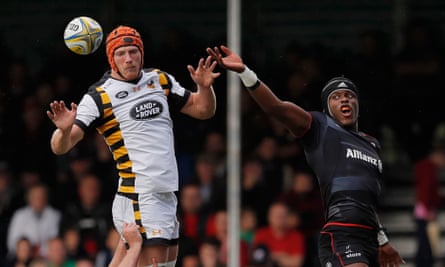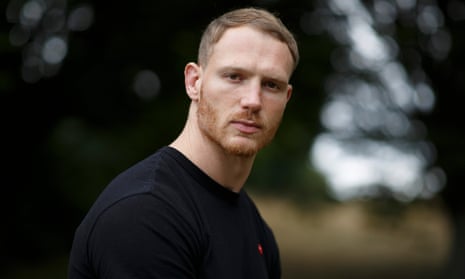No one is paying much attention to the tall man sitting quietly on a sunny hotel terrace in Richmond. Such is life for the majority of professional rugby players, even those with 13 years of sterling club service. Kearnan Myall played more than 200 games for Wasps, Sale and Leeds and toured with England to Argentina in 2013 without many people contemplating the human being beneath the headguard.
Only a few close friends know about the secret battles the 32‑year‑old has been fighting. His hugely important story, told here for the first time, will change all that and, hopefully, have a significant impact on the sport at all levels worldwide. Because rugby, Myall firmly believes, is facing a mounting crisis in terms of the mental strain on its participants. In the most extreme cases, such as his own, it is driving leading players to the brink and sometimes beyond.
Which is partly how, on a mid‑season break with a group of Wasps players, he came to be staring blankly out at the Dubai skyline from the wrong side of a 15th-floor apartment balcony. “I imagine suicide is very different with different people,” he says, looking down at his flat white. “With some people it’s a cry for help but that wasn’t what I was doing at all. I just wanted the situation to be over. Luckily one of my teammates, Charlie Davies, came out, grabbed me and dragged me back over. I remember him shouting at me: ‘What are you doing?’ I just started crying and saying: ‘I don’t know.’ I can’t say if I was going to do it but I was in a place where it wasn’t a big deal. I’d already made my peace with it. It was just a case of it happening at some point in time.”
Myall’s testimony is all the more striking because the 6ft 7in Yorkshireman is such an intelligent, honest witness. His only reason for going public is to help those in similar states of despair. He is also about to embark on a PhD in psychiatry at Oxford University, researching mindfulness and mental health in athletes, with the aim of helping players to cope with the stresses of their harsh trade.

An alarming number, he believes, are struggling with anxiety, not least within the current England squad. “There are several England players I know who dread going into camp. They don’t want to go there.” Some have been resorting to meditation as a coping mechanism. “It’s nothing to do with being worried about the physical aspects of training, or the media. It’s a combination of pressure, scrutiny, what’s going to be said and what they’re going to be made to do within the confines of the camp. What are the longevity of those sort of tactics?”
If no one else is prepared to sound the alarm, Myall feels compelled to do so on behalf of his fellow professionals. The Rugby Players’ Association says the number of Premiership players phoning its confidential helpline has tripled over the past three years. Academy hopefuls are taught how to be rugby players but not, necessarily, how to cope with real life. Myall also says their sport is changing fast. “The pressures in rugby are only going to get bigger. They’re increasing season on season far quicker than anything that is supposed to be helping people.”
Myall knows from experience how vulnerable players can be. For 10 years he was a model pro, an athletic, smart lock with an impressive work ethic. He was pretty much “at the peak of my career” when his personal life took a sudden downturn. The breakdown of a long-term relationship released a complex tangle of emotions and caused Myall to question everything about himself. “It just sent me into a spiral. I began to think I must be a really shit person. It got to the point where I convinced myself I was worthless, that I was a burden on everybody around me. The only way I felt I could solve the problem was to take myself out of the picture and commit suicide.”
His early rugby life, he believes, was a contributory factor. As a promising youngster he was picked up by the Leeds academy, overseen by Stuart Lancaster, later to become the England coach. Myall has only good things to say about Lancaster – “If it wasn’t for him I probably wouldn’t have been a professional rugby player” – but his first taste of representative rugby was particularly grim. “When I was 17 we’d get sent down to England’s under-18 national academy camps in Bath. The training was horrific. They got it completely wrong. I did it for a year and was thinking: ‘I don’t want to play rugby any more.’”
When he returned to Leeds, Lancaster used him as a case study for his level five coaching qualification. One of the coach’s aims was to see if he could help a fine athlete become more confident and assertive; Myall, though, was increasingly aware of being perceived by some as mentally weak based on the harsh – and, in his view, unfair – feedback from his painful national academy stint. “It was simply because I didn’t want to be there. I was just getting through training because I had to.” Others may now wonder if it is entirely a coincidence that several of his age-group contemporaries – Danny Cipriani, Danny Care, Ryan Lamb, Rob Webber – have also had their subsequent off-field problems.

Myall was fine until “out of nowhere” his crippling depression struck. His off-field behaviour soon began to deteriorate. “There was a period of two to three months where I’d made peace with the fact that, at some point, I was going to commit suicide. I was drinking a lot, I was spending thousands of pounds on nights out. One Saturday night, in the middle of the season, I went out and took a load of cocaine. If you’re caught in competition you get banned for four years. I was 27, so it would have been the end of my career.”
Less than 48 hours later, fate decreed he was chosen to undergo a random drug test. He returned a positive sample. Under the Rugby Football Union’s drugs policy, first-time offenders remain anonymous, cop a fine and are sent for medical help. “It was probably the best and most lucky thing that could have happened to me. It’s basically a test to clean up people like me, who either have a drugs problem or are in trouble. You get fined £5,000 and sent to see a psychiatrist in central London. I sat down and explained how I was feeling. Very calmly he explained I was clinically depressed. I remember sitting there thinking: ‘I’m not clinically depressed. Do you not know I’m an athlete?’”
Throughout this troubled period, remarkably, his form was excellent. “I was playing some of the best rugby I’d ever played. I didn’t care. I was going out and just throwing my body around. It was completely unsustainable. One weekend we played Harlequins at the Ricoh. The night before I remember being on my hands and knees on my hotel room floor just crying and crying. I still felt terrible the following morning, then went out and played probably my best game of the season.”
Confiding in other people felt impossible. “You don’t want other people to know you’re struggling. It comes across as weakness. Was that innately programmed into me? I just thought that if I mentioned the problems I was having I wasn’t going to get picked. Then I wouldn’t get another contract and it would all get worse.”
When Myall did finally admit to a staff member he was sleeping poorly he was told to “make sure you jerk off before you go to sleep”. No one seemed to notice when Myall started fudging his daily “wellbeing” tests. “I was thinking: ‘If I’m too honest they’re not going to play me. They’re going to see how much of a hole I’m in.’ I was adding 30-40% to my answers.”
Now, having stepped off the remorseless treadmill of club rugby to pursue a blue with Oxford in this year’s Varsity match in December, he cannot believe how much more relaxed – “It is like a weight has been lifted” – he feels. He has a new partner and has found meditation and mindfulness hugely helpful.
While completing a masters degree in neuroscience he came across extensive scientific evidence of the benefits and believes rugby needs to stop obsessing with players’ gym strength at the expense of the mind. “So much time and money is spent on optimising 50% of an athlete’s life. Very little is spent on the rest.”
Myall is also a firm believer in early intervention and a trial programme at academy level in England will form a key part of his PhD research. For all the good work being done by the RPA, the game should be hugely grateful to its lanky whistleblower for his candour, which, hopefully, will prompt a change in how the sport treats its most vital assets.
“Rugby is an amazing game and it’s given me so much but it’s 24/7. Your life is your job. If you’ve got a problem it filters into your entire life.
“A lot of the guys in charge have come from the amateur days when it’s a release to come to training and bash a few heads together two to three times a week. It’s a case of: ‘You need to toughen up, get your head down, work hard.’ You’d expect that as players get paid more they’d get looked after better but from what I’ve seen they’re becoming more disposable.”
If Myall’s powerful testimony does not change attitudes, it will be a travesty.
In the UK and Ireland, Samaritans can be contacted on 116 123 or email jo@samaritans.org or jo@samaritans.ie. In the US, the National Suicide Prevention Lifeline is 1-800-273-8255. In Australia, the crisis support service Lifeline is 13 11 14. Other international helplines can be found at www.befrienders.org.
